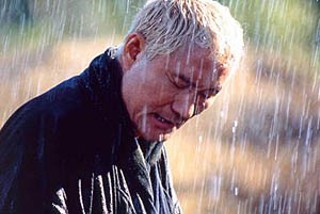Blind Ambition
Takeshi Kitano on Updating 'Zatôichi'
By Marc Savlov, Fri., Aug. 27, 2004

Japan's Takeshi "Beat" Kitano, now 57, has parlayed his rampant popularity in Japan into an eclectic film career that has resuscitated the once-moribund Japanese yakuza genre with a series of films – Sonatine, Fireworks, Brother – that merge traditional Japanese themes of honor and betrayal among the denizens of the criminal underworld and the righteously hard-boiled cops who pursue them with a lyrical and stylistic poetry.
Kitano's new one, The Blind Swordsman: Zatôichi, is a departure, of sorts. There are no guns or black-suited and elegant thugs; instead, the film is an updating of the immensely popular and long-running Zatôichi series of films, which starred, until 1997, the late Shintarô Katsu as a blind, gambling-addicted swordsman-cum-masseur who roamed feudal Japan doling out well-earned beatings and bloodshed (and, occasionally, hard-luck wisdom) and generally proving to one and all that just because a man is sightless doesn't mean he can't make a killing and then kill you. Kitano's stately, fluid new version is not only a precision-tuned instrument of improbable action but also something of a cheeky comedy.
We spoke to Kitano via e-mail on the eve of Zatôichi's Austin release last week and discovered that the blind swordsman isn't the only one frequenting houses of marginally ill-repute.
Austin Chronicle: The Zatôichi story has been filmed many, many times in the past – why the urge to update it? It's hardly the typical Beat Kitano film.
Takeshi Kitano: Several years ago, Chieko Saito asked me if I would make a Zatôichi sequel as a favor to her. [Chieko Saito is a strip-club owner in her 70s]. She said it had been years since Shintarô Katsu's demise, and she wanted to pay him a tribute on the seventh anniversary of his death. She was developing this project with surviving members of Katsu's production. I thought it was interesting: I had always wanted to direct a Jidai-geki (Japanese period piece). But I was flabbergasted when she told me she also wanted me to play the lead character! There was no way I was going to try and replace the image of Mr. Katsu's trademark character! I politely declined, but Madame Saito wouldn't take no for an answer. ... I finally gave in on one condition: I would have to be allowed to make the film the way I wanted as long as the main character remained a blind masseur named Zatôichi who is also a master swordsman and a dice-gambling genius. Everything else would have to be entirely my own creation. And also, if I were to direct this film, I needed to work with my producers and my usual key crews. She agreed and worked to clarify the rights with Katsu's people.
AC: Zatôichi has a lot of humor in the storyline – in America you're known far more for your spectacularly refined action sequences and dramatic narratives than for your sense of humor, but you started out in Japan as a comedian. How have early experiences with comedy informed your filmmaking?
TK: The basic premise of the Zatôichi story was in itself preposterous enough for me to set out to make an all-out entertainment piece and to explore terrain I wouldn't have in my typical auteur pieces. My approach was not so much to remake the Zatôichi films or bring something new to the role, but to create an entirely new Zatôichi, a new film and a new character that has very little in common with Katsu's original except for the basic premise that he's a blind masseur cum master swordsman with a sword hidden in a cane. I respect traditions, but it's my feeling that we can add new things to them. For tradition to continue being relevant to our time, it needs a certain amount of rejuvenation. ![]()
The Blind Swordsman: Zatôichi opened in Austin last week. For showtimes, see Film listings, p.88. For an extended version of this interview, see austinchronicle.com.











